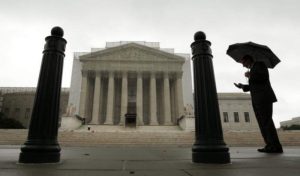It’s been said that leaving the U.S. Supreme Court with only eight members isn’t a big deal, that it won’t really affect Iowans. But it already has.
The most discussed SCOTUS deadlock thus far came Tuesday, when an evenly divided court couldn’t find consensus in Friedrichs v. California.
The case was expected to end or significantly alter the ability of public-sector unions to collect fees from unaffiliated workers — a process well known by Iowans as “fair share” — but the eight-member court instead handed a victory to organized labor.
The case was part of a multiyear initiative by several conservative groups hoping to weaken the unions that represent teachers, law enforcement officers and other public-sector workers. And, based on oral arguments in January, it should have been a conservative victory.
While the deadlocked decision won’t set precedent, it does set the efforts of such conservative groups back, essentially resetting the political game board and creating uncertainty on the success of a future challenge.

Legal counsel for Gov. Terry Branstad also joined with attorneys general from 19 coal-fired power-plant-dependent states in an attempt to stall environmental regulations.
The Environmental Protection Agency issued a regulation in 2012 that requires power companies to reduce emissions of mercury and other pollutants linked to public health.
The Supreme Court issued a 5-4 decision last year, written by late Justice Antonin Scalia, that tossed the issue back to a lower appellate court, essentially requiring the EPA to determine the regulation’s compliance cost. The lower court has allowed the EPA to continue to enforce the regulation while establishing estimates.
The 20-state coalition petitioned the Supreme Court to overturn that decision, to halt enforcement until a cost-benefit analysis was complete.
Without Scalia’s fifth vote, the Court was poised to deadlock. Instead, Chief Justice John Roberts issued a brief order in early March denying the states’ petition.
Likewise, the Affordable Care Act mandate that contraceptives be covered by employer health insurance is before the court. Although only one of five federal appeals court cases came down against the mandate, the high court still was anticipated to set the mandate aside, at least in part.
Without Scalia, another deadlock looms, even as the remaining justices strive for consensus.
On Wednesday, the court requested additional information. They’d like to know if there is a way for organizations, such as the group of nuns at the heart of the case, to meet the government’s contraceptive goals without becoming directly “involved” in providing contraceptives through their insurance.
If the court deadlocks, however, it could set the stage for an inconsistent federal standard. The 8th Circuit Court of Appeals, which covers Iowa and six other states, did not uphold the legality of the contraceptive mandate. Those states could be bound by their lower court’s decision while other states are bound by decisions that the mandate was legal.
The Supreme Court has nine justices for a reason.
If Scalia’s seat is left vacant for a year (or more), Americans can expect to have more legal decisions made de facto by the lower courts, which often lean left.
Senate Republicans, especially U.S. Sen. Chuck Grassley, are taking a big risk. And, in the case of the regulations on mercury emissions, they’re gambling with the profits of Iowa industries.
Even if the cases return at some point to a fully stocked Supreme Court bench, even if no precedent is set, the vacant seat has repercussions.
This column by Lynda Waddington originally published in The Gazette on April 3, 2016. Photo credit: Kevin Lamarque/Reuters
